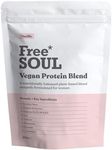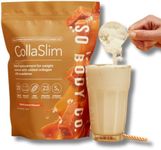Buying Guide for the Best Weight Loss Protein Powders
Choosing the right weight-loss protein powder can be a crucial step in achieving your fitness goals. Protein powders can help you feel fuller for longer, support muscle growth, and aid in recovery after workouts. However, with so many options available, it's important to understand the key specifications to make an informed decision that aligns with your needs and preferences.Protein ContentProtein content refers to the amount of protein per serving in the powder. This is important because protein helps build and repair muscles, and can also keep you feeling full, which is beneficial for weight loss. Protein powders typically range from 15 to 30 grams of protein per serving. If you're looking to increase muscle mass or have higher protein needs, opt for powders with higher protein content. For general weight loss and satiety, a moderate amount of protein per serving should suffice.
Type of ProteinThe type of protein in the powder can affect how your body absorbs and uses it. Common types include whey, casein, soy, and plant-based proteins like pea or hemp. Whey protein is fast-absorbing and great for post-workout recovery, while casein is slower-digesting and can keep you full longer. Plant-based proteins are suitable for those with dietary restrictions or preferences. Choose a type that fits your dietary needs and how you plan to use the protein powder.
Calorie ContentCalorie content is the number of calories per serving of the protein powder. This is crucial for weight loss as you want to ensure you're not consuming more calories than you burn. Protein powders can range from low-calorie options (around 100 calories per serving) to higher-calorie options (over 200 calories per serving). If your goal is weight loss, opt for lower-calorie powders to help maintain a calorie deficit.
Added IngredientsMany protein powders contain added ingredients such as vitamins, minerals, fiber, and sweeteners. These can enhance the nutritional profile of the powder but can also add extra calories or sugars. Look for powders with minimal added sugars and artificial ingredients. If you have specific dietary needs, such as needing extra fiber or vitamins, choose a powder that includes these beneficial additions.
Flavor and TasteFlavor and taste are important because you'll be more likely to stick with a protein powder that you enjoy. Protein powders come in a variety of flavors, from chocolate and vanilla to more exotic options like matcha or peanut butter. Consider your personal taste preferences and how you plan to use the powder (e.g., in smoothies, shakes, or baking). Trying sample sizes or reading reviews can help you find a flavor you’ll enjoy.
MixabilityMixability refers to how well the protein powder dissolves in liquid. A powder that mixes well will be easier to incorporate into shakes and recipes without clumping. This is important for convenience and texture. Powders that mix easily with water or milk are ideal for quick shakes, while those that blend well in smoothies can be more versatile. If you’re often on the go, choose a powder known for good mixability.














